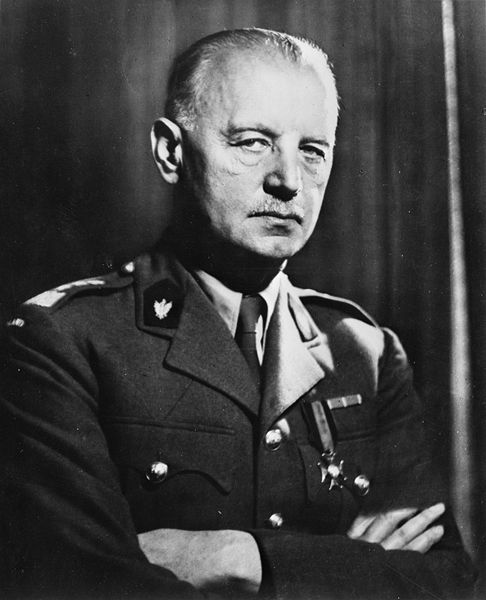From http://www.history.com
Jul 4, 1943:URL: http://www.history.com/this-day-in-history/polish-general-fighting-for-justice-dies-tragically
Polish general fighting for justice dies tragically
".......
On this day in 1943, Polish General Wladyslaw Sikorski dies when his plane crashes less than a mile from its takeoff point at Gibraltar. Controversy remains over whether it was an accident or an assassination............".
Born May 20, 1888, in Austrian Poland (that part of Poland co-opted by the Austro-Hungarian Empire), Sikorski served in the Austrian army. He went on to serve in the Polish Legion, attached to the Austrian army, during World War I, and fought in the Polish-Soviet War of 1920-21. He became prime minister of Poland for a brief period (1922-23).
When Germany invaded and occupied Poland in 1939, Sikorski became leader of a Polish government-in-exile in Paris. He developed a good working relationship with the Allies-until April 1943, when Soviet Premier Joseph Stalin broke off Polish-Soviet diplomatic relations after Sikorski requested that the Red Cross investigate the alleged Soviet slaughter of Polish officers in the Katyn forest of eastern Poland in 1942.
After Germany and the USSR divided up Poland in 1939, thousands of Polish military personnel were sent to prison camps by the Soviets. When Germany invaded Russia in 1941, Stalin created a pact with the Polish government-in-exile to cooperate in the battle against the Axis. Given the new relationship, the Poles requested the return of the imprisoned military men, but the Soviets claimed they had escaped and could not be found. But when Germany overran eastern Poland, the part that had previously been under Soviet control, mass graves in the Katyn forest were discovered, containing the corpses of over 4,000 Polish officers, all shot in the back. The Soviets, apparently, had massacred them. But despite the evidence, the Soviet government insisted it was the Germans who were responsible.
Once news of the massacre spread, a formal Declaration of War Crimes was signed in London on January 13, 1943. Among the signatories was General Sikorski and General Charles de Gaulle. But Sikorksi did not want to wait until after the war for the punishment of those responsible for the Katyn massacre. He wanted the International Red Cross to investigate immediately.
It is believed that Britain considered this request a threat to Allied solidarity and some believe that in order to silence Sikorski on this issue, the British went so far as to shoot down his plane. There is no solid evidence of this.
After the war, the communist Polish government officially accepted the Soviet line regarding the mass graves. It was not until 1992 that the Russian government released documents proving that the NKVD, the Soviet secret police, had been responsible for the Katyn slaughter-backed up by the old Soviet Politburo.
"..... In January 1942 British diplomat Stafford Cripps informed General Sikorski that while Stalin planned to extend Polish borders to the west, by giving Poland Germany's East Prussia, he also wanted to considerably push Poland's eastern frontier westwards, along the lines of the Versailles concept of the Curzon Line, and acquire Lwów and Wilno, if not both.[22] Sikorksi's stance on eastern borders was not inflexible; he noted in some documents that some concessions might be acceptable, however, giving up both Lwów and Wilno was not.[22]......."
[ http://en.wikipedia.org/wiki/W%C5%82adys%C5%82aw_Sikorski#Death ]
"....In Lviv, the population in 1910 was approximately 60% Polish[11] and 17% Ukrainian. This city with its Polish inhabitants was considered by many Poles to have been one of Poland's cultural capitals. For many Poles, including Lviv's Polish population, it was unthinkable that their city should not be under Polish control........." - from wikipedia quoted by Douglas Willinger in his:
Sunday, February 9, 2014
Crafted in Austria 'West Ukrainian' Nationalist Movement
http://continuingcounterreformation.blogspot.it/2014/02/crafted-in-austria-west-ukrainian.html
See also:
Was General Sikorski a victim of the Katyn massacre?
http://www.polishnews.com/historia-history/historia-polskipolish-history/537-was-general-sikorski-a-victim-of-the-katyn-massacre
Monday, March 10, 2014
The spy who came - II
http://control-avles-blogs.blogspot.it/2014/03/the-spy-who-came-ii.html





Interesting, it seems only time they allow such important polish spies to speak is when the USSR was about to be dissolved
ReplyDeletehttp://en.wikipedia.org/wiki/Ryszard_Kukli%C5%84ski
http://translate.google.com/translate?hl=en&sl=pl&u=http://solidarni2010.pl/20336-w-dziesiata-rocznice-smierci-pulkownika8230.html%3FPHPSESSID%3D4e6321b9c2eed91b9f2855e9e0dc2320&prev=/search%3Fq%3DLech%2BKaczy%25C5%2584ski%2BRyszard%2BKuklinski%26client%3Dfirefox-a%26hs%3DRyK%26rls%3Dorg.mozilla:bg:official%26channel%3Dsb%26biw%3D1143%26bih%3D676
Lech Kaczynski spoke to former colleagues of Colonel:
"No, gentlemen, you are not traitors, but he is a hero."
http://www.pacwashmetrodiv.org/events/kuklinski/brzezinski.keynote.htm